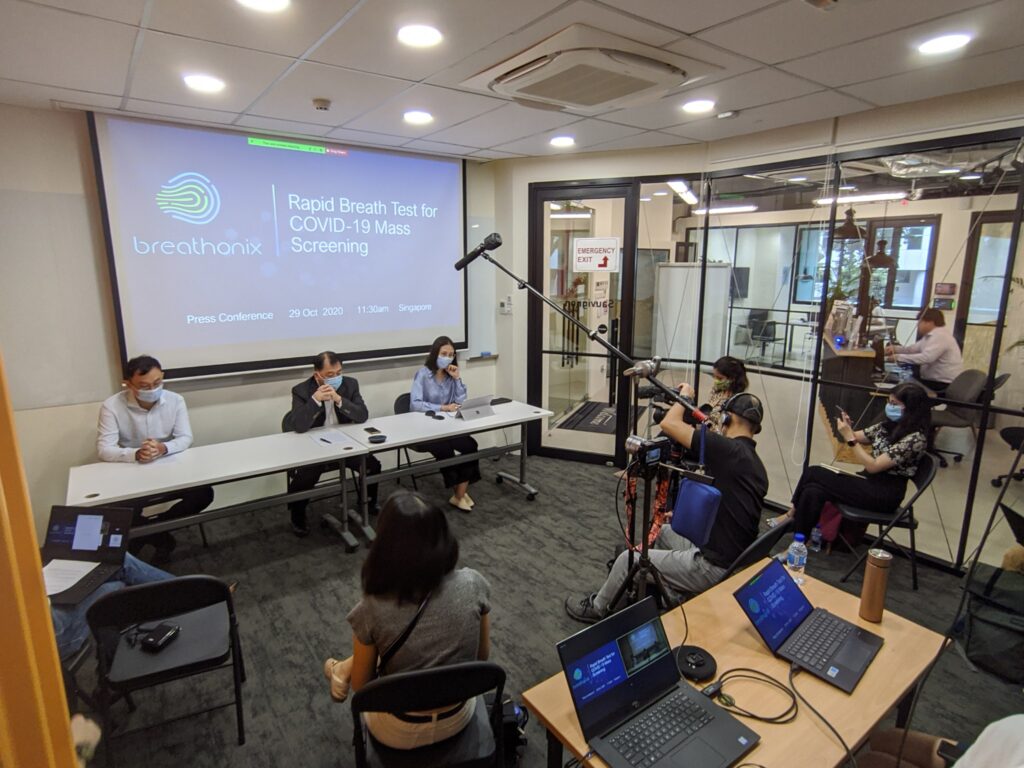
Breathonix has developed a breath test to detect COVID-19 within a minute in-situ (on-site), achieving an accuracy above 90% at a recent pilot clinical trial involving 180 patients.
BREATHONIX BREATHLYZER TECHNOLOGY
The principle of the breath test is fundamentally different from current PCR (Polymerase Chain Reaction) tests. The platform detects and processes Volatile Organic Compounds (VOCs) in human breath to determine if a person is infected with the coronavirus. This allows for real-time, on-site diagnosis, which differs from the labor-intensive and time-consuming swab tests based on RT-PCR (Reverse Transcriptase – Polymerase Chain Reaction)
“Using the cutting-edge mass spectrometry, we are able to discern hundreds of VOCs in the molecular level to generate the bio-fingerprint of COVID-19,” said Dr. Jia Zhunan, CEO and co-founder, “Based on more than 6 years of research at the National University of Singapore, we have developed highly sophisticated proprietary breath sampling technique and analytical method to achieve high accuracy, sensitivity and specificity.”
A critical advantage of the device is that it is easy to use and completely non-invasive. A person needs only to exhale into a disposable mouthpiece connected to the system and the test result will automatically be generated.
COVID-19 CLINICAL TRIAL RESULTS
A pilot clinical trial involving 180 patients was conducted at the National Centre for Infectious Diseases (NCID).
“Results from the pilot clinical trial showed that Breathonix achieved clinical accuracy of greater than 90%; with sensitivity of 93% and specificity of 95% through in-built machine learning algorithm,” stated Dr. Jia.
The clinical trial is on-going, and more tests are required to further improve the accuracy of the technology.
Mr. Du Fang, COO and Co-founders, stated that “the Breathonix system is designed to ensure user safety and prevent potential cross-contamination.”
During the clinical trial, each person undergoing the test uses a disposable mouthpiece with a one-way valve and a saliva trap, preventing inhalation and any saliva from entering the Breathonix breathalyser platform. This makes cross-contamination unlikely.
POTENTIAL DEPLOYMENT & INTERNATIONAL PILOTS
“With the advantages of 60 seconds in-situ test of COVID-19, the Breathonix system could potentially be used for mass screening in areas of high human traffic,” said A/Prof Neo Kok Beng, Chairman of Breathonix. “We believe we can contribute to the global economy through fast, accurate and cost-effective screening.”
If assessed to be suitable, the Breathonix breath analysis platform could be deployed in airports, sea ports and transportation hubs. It is also useful for sports venues and games like the Olympics.
“The company is ready to deploy pilots in Singapore in coming weeks and to extend to international pilots in the coming months, pending regulatory approval,” said Du Fang.
“Breathonix is also in active discussion with a major hospitality player in Singapore,” said Dr. Jia Zhunan. “We are working on a fast workflow process that is suitable for episodic screening for events such as conferences, sports and concerts.”
SERVICE MODEL & PRICING
Breathonix intends to provide one-stop service to its clients, including professional manpower and machines on-site in customer premises. This will ensure the highest level of service quality and continuous system upgrading of screening accuracy.
The company targets at US$20 per test, which is more than 70% reduction in cost based on current RT-PCR process.
Media Contacts:
Dr JIA Zhunan
CEO & Co-founder
[email protected]
+65-6811-2133
DU Fang
COO & Co-founder
[email protected]
ABOUT BREATHONIX
Breathonix is a deep-tech venture specializing in advanced breath analysis technology for the detection and prevention of respiratory disease and cancers. It is a start-up of the National University of Singapore (NUS) through its Graduate Research Innovation Programme (GRIP).
